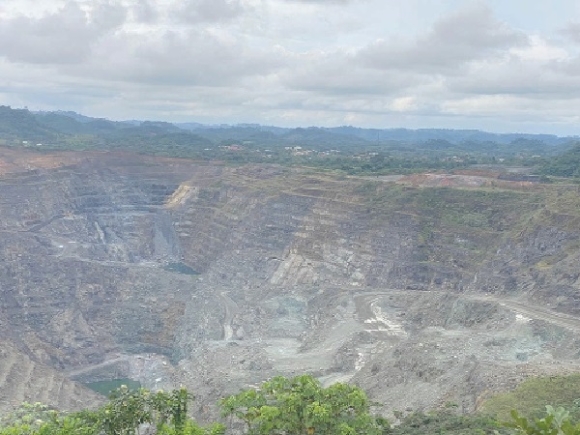
$450m manganese refinery project next month — 1,000 jobs to be created
The Ghana Manganese Company (GMC) will from next month commence the construction of a manganese refinery which will focus on upgrading the current low grade carbonate manganese being produced into a high valued product with enhanced marketability.
Phase one of the project which is expected to be completed within 24 months involves the construction of a 45MW power plant (natural gas) and a Mechanic power transmission refinery,
The project will also come with some associated logistical investment into a dedicated mineral railway line and optimisation investment at the Port of Takoradi to further enhance the future export operations of manganese ore.
This is expected to be done at a cost of $240 million. Phases 2 and 3 will take the total investment into the refinery to $450 million.
In an interview with the Graphic Business after a tour organised by the Ghana Chamber of Mines, the General Manager of GMC, Joseph Ampong, said the government, which held a 10 per cent stake in the company would cut the sod early this month for construction to begin.
When completed, he said the refinery would create over 1000 direct jobs and boost the revenue of the company.
He said the company was planning to ramp up manganese production to 8 million tonnes per year, out of which it intended to refine about five million locally.
Power challenge
Commenting on why it had taken the company so long to consider building a refinery, he cited the non-availability of power as the challenge.
“Look, this project, the power alone required is about 45,000 megawatt power. If power is not available, there's nothing we can do to set up the refinery to add value to the existing ore we have.
“So it's critical, in this project, Genser Energy is the one we are depending on to provide us with the power for this project and its going to be a gas plant,” he stated.
He said the company would rely on gas from Atuabo to power the plant.
“I think at some point, they made an attempt to put up the gas plant to cast iron and manganese carbonate deposit so that it becomes very rich before we send it down. But due to power issues, it couldn't materialize so now we are coming up with new interventions to make sure it works,” he added.
Economic benefits
Mr Ampong said the refinery would add value to the country’s manganese before exports, a situation which would improve its revenues and the country’s foreign exchange inflows.
“We are also going to create job opportunities for people in this community and across the country in general and also generate more revenue for the state in terms of taxes.
“So definitely, we're going to have a lot of advantages bringing the refinery on board. The grade we are mining now is low, we are currently selling at 26.5 per cent but when you upgrade it, you refine it, you can get it at 40 per cent and above,” he explained.
He said the company was looking forward to a steel industry being established as a result of its refinery.
“We are not looking at establishing the steel industry, we are looking at adding value to whatever we are exporting. So if in the future, an entity decides to have a steel plant in Ghana, then probably they will buy from it,” he said.
Global demand
The General Manager pointed out that looking at the global demand, the steel industry alone consumes 75% of the global manganese produced, with 20 per cent and 5 per cent going into batteries and fertilizer respectively.
Looking into future trends, he said with the current information about renewables and the shift away from fossil fuel to electric vehicle, manganese, lithium, and other critical minerals were going to be very critical going forward.
“Manganese is part of the critical piece that forms electric vehicle batteries. So if you read of late, you will see we are talking about green minerals, critical minerals, and manganese is part of it.
“And then going forward also, there is also a technology that is recycling old batteries, also to bring it back again into life, which is good for sustainability,” he added.
Russia/Ukraine war
Mr Ampong also noted that GMC was one of the companies which was heavily hit by the ongoing Russia and Ukraine conflict.
He said China and Ukraine were the two main export destinations of the company and Russia’s invasion of Ukraine meant that it was now only left with China in terms of exports.
“When Russia invaded Ukraine, the second leg of our business operation was totally taken off. And as we speak, we haven't been able to recover that leg of the business.
“So what currently we are doing is that we are looking at possible markets available globally to keep ourselves still going. So revenue-wise, we have come down,” he explained.